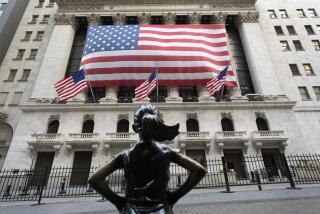Bali Bombing Dashes Hopes for Indonesian Recovery
- Share via
As leading U.S. investors in Southeast Asia met last month on the resort island of Bali, they were heartened by recent improvements in Indonesia’s long-troubled economy, including increased spending on computers and consumer goods.
But last weekend’s nightclub bombing, which killed at least 188 people, has dashed hopes for a near-term recovery given the damage inflicted on the country’s tourism industry, its third-largest source of revenue.
The blast also is expected to scare away badly needed foreign investment.
“We saw Indonesia making the turn, though we were well aware of the risk and the security situation,” said Ernest Bower, president of the U.S.-ASEAN Business Council, who was at last month’s meeting. “We thought investment would actually pick back up this year.”
The council promotes business between the United States and the Assn. of Southeast Asian Nations. Its board of directors includes executives from Unocal Corp., General Electric Co., Goldman Sachs Group and Boeing Co.
Saturday’s attack, which has been tied to Islamic terrorists, dashes the hope that new funds will flow into Indonesia and increases the likelihood that frightened locals will ship their money out, at least in the short term. Before the attack, economists had predicted that Indonesia’s economy, which has been struggling since the 1997 financial crisis, would expand by as much as 4.5% this year. Those estimates are being revised downward by the day.
Indonesia’s well-being is of great concern to California firms such as Unocal Corp., ChevronTexaco Corp. and Edison Mission Energy, which are among the country’s leading U.S. investors. California tourists, particularly surfers and well-heeled travelers, also are heavily represented among the 1.5 million people who visit Indonesia each year, with Bali ranking among the most popular destinations.
“It is clear that it will be fairly devastating,” said Jack Daniels, an American living in Bali whose small tour company, Bali Discovery Tours, has been hit by cancellations from nervous foreign clients. “We will suffer, but as surely as New York has crawled back, we will, too.”
U.S. business leaders and analysts said the weekend tragedy could, however, improve Indonesia’s economic prospects if President Megawati Sukarnoputri begins taking the threat of Islamic fundamentalism seriously and improves security, particularly around highly visible foreign operations. Indonesia is the world’s most populous Muslim country. After Saturday’s blast, the Indonesian government increased protection at large U.S. energy facilities and began giving foreign executives in Jakarta regular security updates.
“Under the most optimistic spin, this could strengthen Megawati and isolate Islamic fundamentalists,” said Donald Emmerson, director of the Southeast Asia Forum at Stanford University. “Under those conditions, the security of foreign investments will improve. But we’ve got a long way to go from here.”
U.S. firms already operating in Indonesia are accustomed to risk and uncertainty, which is why few are expected to leave the country unless the situation worsens dramatically. The Indonesian economy is heavily dependent on energy exports, and U.S. energy firms lead foreign investments in oil and natural gas production and electric power generation. Chevron’s Caltex Pacific Indonesia operations are the country’s largest foreign revenue earner and account for nearly half of Indonesia’s crude-oil production.
Energy firms are used to dangerous conditions because they often find themselves seeking oil or gas reserves in politically unstable regions. Last year, Exxon Mobil Corp. shut down its natural gas operation in the Indonesian province of Aceh for four months after it was caught in a battle between the military and insurgents.
Many U.S. firms such as Nike Inc., IBM Corp., Motorola Inc., and Procter & Gamble Co. have used Indonesia as a low-cost production base for decades, sticking out the political instability that followed the financial collapse of 1997 and the ensuing violence and anti-Chinese riots that led to the ouster of former President Suharto.
In the last few years, firms such as Cisco Systems Inc. have seen their sales in Indonesia grow at a healthy pace as the domestic economy began to turn around, according to the U.S.-ASEAN Business Council.
But Indonesia’s economic prospects have suffered from the political instability. In addition, the funds flowing out of Indonesia have been greater than the investment coming in.
James Castle, founder of a consulting firm based in Jakarta, said foreign investors are looking for solid evidence that President Megawati is ready to tackle some of the problems that have scared foreign investors away, including onerous tax policies, a weak judiciary and foot-dragging on privatization of protected industries.
More to Read
Inside the business of entertainment
The Wide Shot brings you news, analysis and insights on everything from streaming wars to production — and what it all means for the future.
You may occasionally receive promotional content from the Los Angeles Times.










